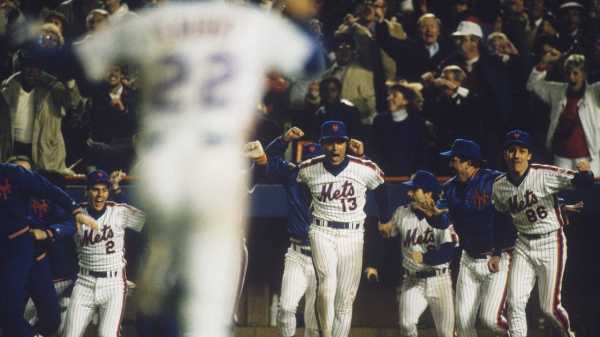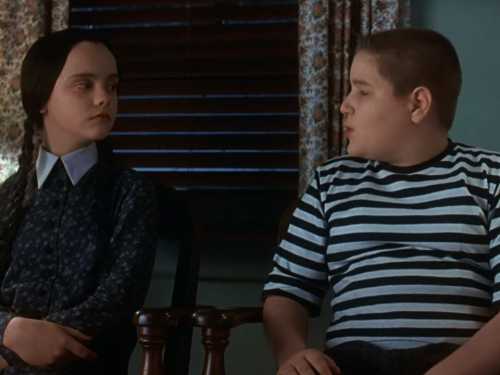
Shortly after I first moved to Rome, more than twenty years ago, the Mets made the World Series. I wanted to watch the games because I was a Mets fan, born and bred near Shea Stadium, in Flushing, Queens. They were playing the hated Yankees in the first subway series in nearly fifty years, which made watching the series imperative. But the games continued after the bars closed, I had no satellite television in my small apartment, and the era of live streaming and Wi-Fi had not yet dawned. So my roommate and I carried folding chairs, wool hats, blankets, and plenty of Peroni bottles to a Canal+ storefront near the Pantheon. One of the dozens of small, stacked screens behind the thick glass mutedly played the game. Night after night, we shivered and watched. I called my father, who was watching in his basement back home, and told him what I was doing. I thought he’d get a kick out of it. He told me I was crazy and that I should go to bed. The Mets lost.
This year, the Mets made the playoffs again and I was in Rome again, this time with Wi-Fi and a smart television and a son whom I was struggling to raise as a Mets fan. The day after the third and decisive game of the Wild Card series against the Padres, I woke Luca up ten minutes early so we could watch it before school. We shuffled with dread to the TV. As per our ritual, he waited in the hall in his pajamas while I opened YouTube, quickly removing my glasses, so as not to see the final score. I clicked on the blue and orange blur, and we took our seats on the couch and braced ourselves.
For the highlights.
Kids all around America may now prefer recaps and game summaries to the interminable innings, but, since we moved to Italy more than five years ago, we have had no choice but the highlights. Luca, who is ten years old, thinks baseball is a fast, unrelenting, and action-packed sport. He is under the impression that baseball is fun. I’m not sure if he has ever seen a full at-bat since we’ve been here—only third strikes, ball fours, diving catches, errors, and homers. There is no stepping out of the batter’s box or fidgeting with the rosin bag. The pitchers are replaced via jump cut. The announcers are cut off midsentence and picked up in the middle of another sentence. The color commentary is a Surrealist collage.
This is different from how I watched baseball at Luca’s age. I would come home from school, spin the dial on the TV to Channel 9, and do my homework, eat a Devil Dog, practice the piano, oil my new glove, run to the front door to let in my father from his long commute, yell at my little sister for changing the channel, sneak another Devil Dog. This would take me to about the top of the sixth. The game felt endless and close. When rain fell on the infield, it fell on my back yard. The plane that flew over the outfield roared over my roof a few minutes later.
Luca is instead watching games from more than four thousand miles away, in Rome. When day games start, it’s nearly dark and past his bedtime. A plane flying over Citi Field might land here almost ten hours later. I subscribed to streaming services to watch the Mets, but mysterious licensing agreements blocked the games in Italy. I can’t figure out how to unsubscribe. My dollars are donations.
Despite all this, Luca seems to have become a Mets fan. He wears Mets T-shirts and hats. A photograph of Jacob deGrom hurling a fastball stands on his bookcase behind a small statue of Zeus throwing a thunderbolt with a similar form. On trips back from New York, I have topped off suitcases with my old Mets stuff, much of it from 1986, when the Mets won it all and I was eight and thought the Mets would win forever. On Luca’s dresser is a baseball signed by Mookie Wilson. Who wouldn’t want that? There’s another signed by the former coach Bud Harrelson. Maybe not everyone would want that. On his desk stands a Starting Lineup figurine of Howard Johnson, a mustachioed Mets infielder with a .249 career batting average who retired in 1995 and is now sixty-one years old. But Luca cherishes them all, less, I suspect, because he has any idea who these forgotten players are than because they bind him to something no matter where he ends up. He may be uprooted by his father’s job, but he comes from a line of Mets fans who keep mustachioed household gods.
If Luca is about thirty-five years behind in Mets paraphernalia, we are always at least a day behind in the current season, often three or four. (We watched the first two games of this year’s World Series while waiting for a Ryanair flight.) When I was Luca’s age, my father would open the back of the newspaper, say “Let’s see how the Mets did,” and trace his finger down the box score, tracking batting averages and how many games ahead or behind we were. “Well,” he’d say, year after year, “there’s always next season.”
“Want to see how the Mets did?” I would now ask Luca when he came home from school or before dinner. Watching YouTube, I invariably sipped ice water from the supersized souvenir plastic cup that I got at the 2015 World Series game that I somehow scored tickets to and attended with my father. It was the only game of the series that the Mets won. In May, we put on the highlights and grew giddy as the Mets scored seven in the ninth to come back and beat the Phillies. Luca waved the orange 2015 World Series rally towel that I gave him and cheered as loudly as the dozens of apartments erupting with a Roma goal, but alone, as if our timing were way off. In July, we’d steal a few minutes between dinner and gelato to watch the Mets sweep the Yankees.
But all the quick-hit good news—even the quick-hit, and so relatively painless, collapses—made me wonder if Luca was learning the wrong lesson about being a Mets fan. Were these compressed games, these espresso shots of joy, instilling in him the impending sense of doom that so defines our tribe? Was he being prepared for heartbreak? Did he know that the baseball gods, like Zeus on his bookcase, are cruel? Did the highlights fool him into thinking the Mets might actually win this thing?
Then there were the more practical drawbacks. The highlights have given Luca a grasp on the actual rules of the game that is tenuous at best. He is not just bewildered by the new Wild Card system—a confusion that seems universal—but he doesn’t understand a sac fly or how to hit the cutoff man. He has no idea what the cutoff man is. He has never seen situations develop. For him, people simply materialize on second base for no reason. It’s not a walk and then a slow grounder to third, moving the runner to second. It’s highlight magic. He has never played in an actual game, with actual positions, with actual kids.
Most of my childhood weekends were spent in cleats in Cunningham Park. T-Ball. Little League. Travelling teams. I started off good, with a good arm, and then became bad, with a bum one. “Throw the ball!” my father screamed with horror, his fingers clenched around the chain-link fence behind the dugout as I experimented with unorthodox pitching mechanics. “Throw overhand!”
Luca left America before he could start Little League. We practice his fielding on the hard grounds of Villa Sciarra, the park by our house, which is strewn with rocks, twigs, and cones from the umbrella pines above our heads. We avoid the messes left by the dogs running around. Sometimes little kids run up and watch us, wide-eyed. The gladiator lessons that Luca has taken in the park with wooden swords and spears have drawn less attention. He practices his pitching on a small slope by the Villa entrance. I tell him to kick his leg high, like Dwight Gooden did, like my father told me to use my legs more, like Tom Seaver, his favorite Met, did. Tom Terrific, he called him.
The only time that Luca has set foot on a baseball diamond since we moved to Italy was when my mother organized a small family reunion in Florida, over the 2019 Christmas break, just before COVID struck. Luca got a black Louisville Slugger for the holiday, and spent most of the week curled up on a couch with the bat and next to my father, himself now wooden and stiff with pains shooting up his back. One day, I took Luca out to try his new bat. He couldn’t believe the quantity of public baseball fields, diamonds next to diamonds next to diamonds. I pitched to him day after day. Once, my father manifested inexplicably, like a runner on second in a YouTube highlight. Presto.
“He’s good, right?” I said.
“He’s good,” he said, gripping the chain-link fence. “He’s good.”
I actually have no idea how good Luca is. Sometimes he can’t get his glove down, and the ball goes through his legs. He is eaten up by bad hops, and there are only bad hops on the hard, pebbled ground under the pines. (“This would be great for baseball,” Luca said when he stepped on the soft grass of the Palazzo Colonna gardens, when he stared out at the curated lawns behind Galleria Corsini.) But the sharp snap my glove makes when it catches his throws is the sound that it made when I caught the balls of kids who threw real hard. He has an arm. I’m sure of it.
But I have only my memory to compare Luca against. There is no other kid with a baseball glove in the neighborhood, or, as far as I have seen, in the city. His friends all play soccer or fly drones. He can’t have a catch with anyone but me.
“Take it easy. Jesus,” my father reprimanded me once when I threw the ball too hard to him. We were on the street in front of our house in Queens. Right then, I knew something had changed. I was getting too big. He was getting too old.
This summer, as the Mets were doing great, I went back home to help clean out the house because my mother was moving out. My father had died in the middle of the pandemic—the death notice we took out in the paper ran under Tom Seaver’s obituary—and she asked me if I wanted to keep any of his old stuff.
I went through the highlights. In a small manila envelope, I found a patch of Shea Stadium sod from when the Mets won the World Series in 1969. I kept that. I threw out the yellowed and brittle newspaper clippings that celebrated the victory or mourned Seaver’s trade. I found a photo of my father at an impossibly young age, no more than twenty, pitching in an old-time baggy uniform in the late nineteen-forties or early nineteen-fifties, the team name “Saxons” spread across his chest, a bear claw of a mitt on one hand and a high-school-graduation ring on the other. He is warming up next to a chain-link fence, and smiles like someone who knows he is having his picture taken, like someone who can never imagine not throwing hard.
Back in Rome, Luca hung up in his room the “1988 World Champion Mets” poster I brought back—a collector’s item because they blew it—and we watched the innings race by like sped-up nature videos. The Mets bloomed. And then they wilted. The final loss came just before school. The end came in highlights, too.
“I told you,” Luca said, a little heartbroken. But not enough. ♦
Sourse: newyorker.com






